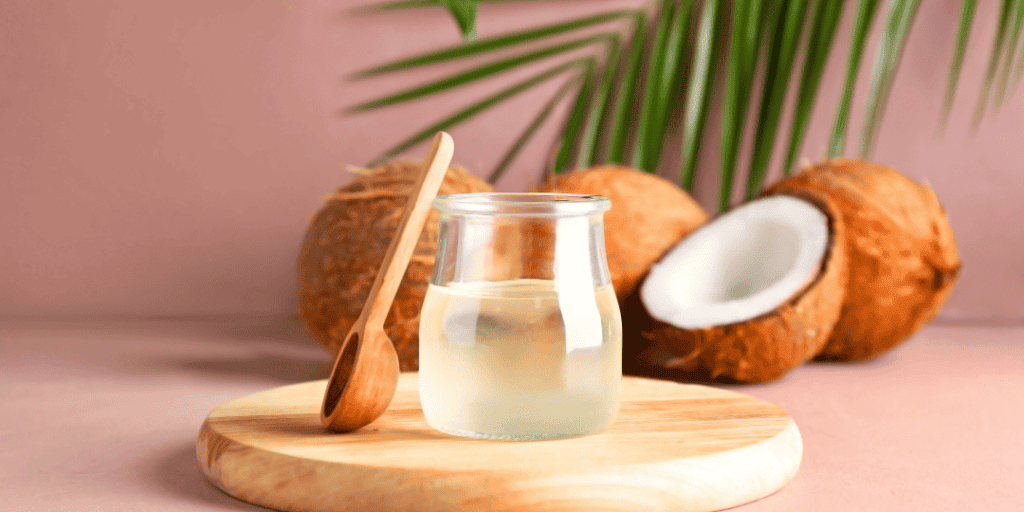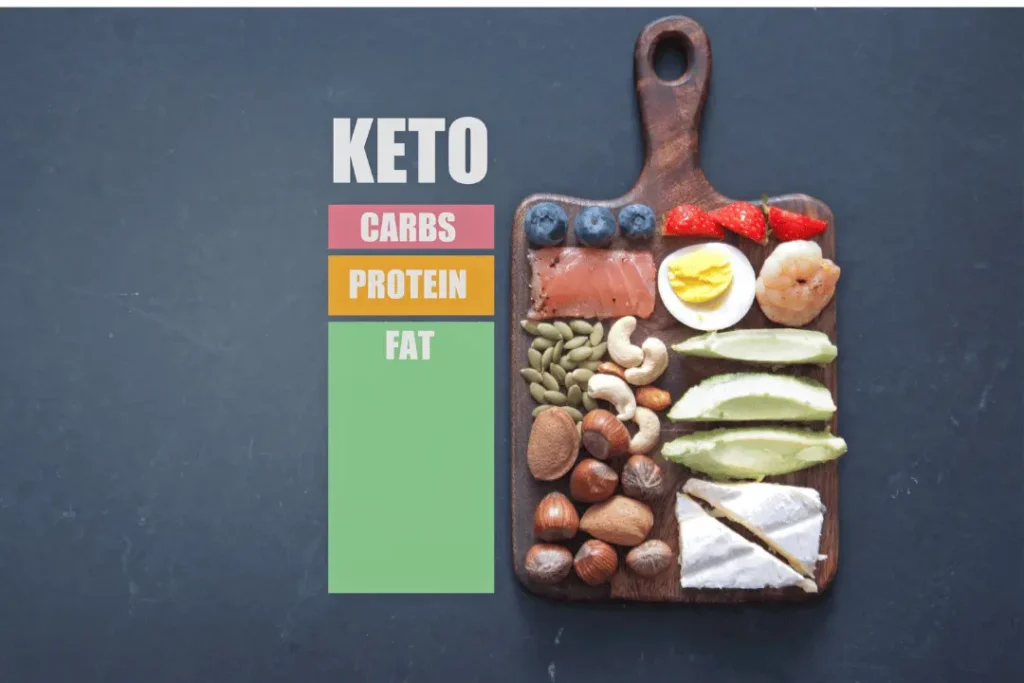Hello, wellness enthusiasts! Ashley Johnson here, eager to explore the fascinating coconut oil properties. Curious about what makes this tropical treasure so remarkable? Join me as we delve into its metabolism-boosting magic and more.
Chock-full of medium-chain triglycerides (MCTs), coconut oil is a fat that doesn’t just sit around. These MCTs are the Usain Bolts of the fat world, sprinting straight to your liver, where they’re converted into a quick energy fix. This speedy process can kick your calorie-burning engine up a notch. Research suggests MCTs can increase your metabolic rate by 5% over 24 hours—that’s a bonus burn you get for free!
To get this metabolic fiesta started, try swirling a tablespoon into your morning Joe to make it luxuriously creamy, whizzing it into your post-gym smoothie, or drizzling it over your sautéed greens. But here’s the deal: practice portion control—coconut oil is rich in calories, so a little goes a long way.
#1 – Heart-Healthy
Let’s shift gears to another of coconut oil’s virtues—its heart-loving qualities. This tropical gem can help boost your HDL (the “good” cholesterol), acting as a shield for your heart[1]. Imagine making a simple swap from butter to coconut oil, akin to choosing a vibrant salad over a greasy snack—a tiny tweak with big-time heart perks.
Studies have tipped their hats to coconut oil, showing it can improve the total cholesterol to HDL ratio, which is a crucial heart health indicator. If you’re pondering a butter alternative, coconut oil is ready to step in. It’s versatile for sautéing, baking, or even as a spread. Go for the refined type if you prefer a milder flavor.
Summary
Coconut oil may benefit heart health by boosting ‘good’ HDL cholesterol and improving cholesterol ratios. It’s a versatile butter alternative for cooking and baking, with the refined type offering a milder flavor.
#2 – Skin Benefits of Coconut Oil
Now, let’s dish on skincare—our body’s canvas that we present to the world. Coconut oil is like your dependable pal who’s got your back, or rather, your skin. It’s a triple threat: a moisturizer, a nutrient powerhouse, and a protector[2]. For those battling dry skin or the sting of eczema, coconut oil might just be your knight in shining armor.
Whip up a coconut oil and honey face mask to see how this combo can drench your skin in moisture. Melt some coconut oil, blend in honey, add a calming scent with lavender essential oil, and voilà! A 15-minute application leaves your skin baby-soft and glowing. But remember, it’s not a one-size-fits-all remedy—do a patch test to ensure it’s right for your skin type.
Summary
Coconut oil may enhance skin health as a moisturizer, nutrient source, and protector, potentially aiding in dry skin and eczema relief. A homemade face mask of coconut oil and honey can offer added moisture, but a patch test is recommended.
#3 – Boosts Your Immune System
Did you know coconut oil could be your secret weapon against germs? Thanks to a fatty acid called lauric acid, coconut oil is a formidable foe to microbes. Lauric acid boasts antimicrobial, antiviral, and antifungal properties. Studies highlight its ability to tackle culprits behind infections like the flu, candida, and strep throat—giving your smoothies a creamy boost and your health a protective edge!
While it’s no magic potion, coconut oil can be a handy natural remedy. A sore throat might appreciate a coconut oil gargle, and a swish could fend off a looming cold. For yeast infections, a gentle application offers comfort. But remember, your doctor’s advice trumps all when it comes to serious health concerns.
Just to reiterate, coconut oil complements a healthy lifestyle; it’s not a panacea. Embrace these insights as stepping stones to a more vibrant, healthy existence. Keep shining, inside and out!
Summary
Coconut oil, rich in lauric acid, may boost the immune system and combat microbes, aiding against infections like the flu and candida. It’s useful as a natural remedy but not a replacement for medical advice.
#4 – Antioxidant Powerhouse
Hey there, health enthusiasts! Let’s dive into the world of antioxidants, where coconut oil is making waves. It’s not just your average kitchen staple; it’s a cellular hero packed with polyphenols that bat away those pesky free radicals causing oxidative stress and damage. It’s like having a tiny superhero team inside your body!
Antioxidants: The Cell Protectors
Polyphenols in coconut oil are the ultimate free radical fighters. Picture a microscopic battle where these antioxidants swoop in to protect your cells from damage. Research supports this, too—a study on liver-injured rats revealed that coconut oil significantly boosted their antioxidant status and curbed lipid peroxidation. That’s science-speak for “coconut oil’s got your cells’ backs!”
The Bigger Picture
Oxidative stress can sneakily contribute to aging, inflammation, and chronic diseases. But remember, coconut oil isn’t a one-man band; it’s more like the bass player in a health-promoting orchestra that includes fruits and veggies. They all work in harmony to create a symphony of antioxidants for your wellbeing. So slather on that coconut oil, but don’t forget the rest of the nutrient-rich ensemble for the ultimate health jam session.
Summary
Coconut oil may act as an antioxidant powerhouse, containing polyphenols that help combat cellular damage caused by free radicals.
#5 – Brain Health
Ever feel like your brain could use a jolt of energy? Coconut oil might just be the brain food you’ve been searching for. Let’s not overlook this gem for our mental function!
Brain Energy Boost
Coconut oil contains medium-chain triglycerides (MCTs) that are like a fast-pass for brain energy, especially for those with glucose metabolism issues or Alzheimer’s disease. One study highlighted that Alzheimer’s patients experienced improved brain function thanks to MCTs. So, why not power up your morning oatmeal with a spoonful of coconut oil to kickstart your cognitive gears?
Remember, It’s Not a Cure
While we can celebrate coconut oil for its brain-boosting qualities, it’s important to note that it’s not a stand-alone treatment for Alzheimer’s disease. Always involve your healthcare provider when it comes to managing brain health.
Summary
Coconut oil, rich in medium-chain triglycerides (MCTs), may offer a brain energy boost, particularly beneficial for those with glucose metabolism issues or Alzheimer’s, but it’s not a standalone treatment.
#6 – Coconut Oil for Hair
Dreaming of hair that doesn’t snap, crackle, and pop? Enter coconut oil, your hair’s new BFF. This natural elixir is the secret to hair that’s not just surviving, but thriving.
Hair’s Best Friend
Coconut oil is a wizard at penetrating the hair shaft, warding off protein loss, and as a result, preventing breakage. When your hair’s wet and at its most fragile, coconut oil steps up as the hero, reducing hair breakage, as confirmed by a study. It’s like having a personal hair guardian that’s on duty 24/7!
DIY Hair Care
For the crafty souls out there, coconut oil is the perfect base for your at-home hair care creations. Whether it’s a shampoo, conditioner, or hair mask, this tropical oil can bring a touch of magic to your routine. Just keep in mind that everyone’s hair is unique, so start with a small amount, and see how your mane responds to this natural treat.
#7 – May Support Your Digestive Health and Gut Flora
Digestive Harmony
Who knew that your pantry staple, coconut oil, could be a digestive superhero? It’s here to soothe your tummy troubles and foster a flourishing gut flora. Think of it as a gut whisperer, promoting intestinal well-being. For instance, research involving mice indicated that coconut oil could bolster intestinal health and enrich bacterial variety, particularly beneficial for those with inflammatory conditions like IBD. Try incorporating coconut oil into your meals—whether it’s a salad dressing or a comforting addition to your favorite soup—and witness the potential digestive benefits unfold.
A Spoonful of Caution
However, a word to the wise: Coconut oil may not sit well with everyone. It’s potent, and your digestive system might need a gentle introduction. Begin with a modest amount to avoid any unwanted side effects like diarrhea or an upset stomach. Your body’s feedback is paramount—tune in and adjust accordingly.
Summary
Coconut oil may enhance digestive health and gut flora, but should be introduced gradually due to its potency and potential side effects.
#8 – Blood Sugar Management
Insulin Sensitivity’s New Best Friend
For those on the lookout for blood sugar balance, let’s talk about coconut oil’s role in keeping those levels in check. It’s especially relevant for individuals managing type 2 diabetes or aiming for consistent energy throughout the day. Studies suggest that coconut oil could positively influence insulin sensitivity and glucose metabolism. Imagine not having to deal with the highs and lows after a carbohydrate-rich meal—coconut oil could help smooth out those spikes. Try adding it to your morning oatmeal or as a healthier fat option in your baking adventures. But remember, moderation is key, and always keep an eye on your blood sugar and insulin levels.
Coconut Oil in Your Culinary Adventure
Incorporating coconut oil into your diet can be both simple and delicious. Use it as a butter substitute in your recipes for a tropical twist that could also help manage your blood sugar levels. As always, moderation is the secret ingredient, and it’s essential to work with your healthcare provider to monitor your health.
Summary
Coconut oil may aid in blood sugar management and insulin sensitivity, and can be easily incorporated into meals, though moderation and monitoring are advised.
#9 – Stress Management
Coconut Oil: The Stress Buster
Let’s shift from the physical to the mental and emotional benefits of coconut oil. It’s like a zen master for your senses, potentially helping to alleviate stress and anxiety. Research has found that coconut oil may lower stress markers, such as cortisol levels and blood pressure. So after a long day, consider a coconut oil-infused self-care routine—massage it into your skin, add it to your bath, or diffuse its soothing scent in your living space.
Relaxation, Coconut Style
While coconut oil can be a fantastic stress reliever, it’s not a substitute for professional mental health care. If stress or anxiety is a constant battle for you, seeking help from a qualified professional is always the best strategy.
Summary
Coconut oil may help reduce stress and anxiety, offering mental and emotional benefits through various self-care practices.
#10 – Oral Health
Oil Pulling: The Oral Health Ritual
And now for a smile-worthy tip: coconut oil can be a game-changer for oral health. It’s got antibacterial powers that can fend off mouth nasties, potentially preventing tooth decay, gum disease, and even bad breath. Studies show promising results, like a reduction in plaque and gingivitis among adolescents practicing oil pulling.
Summary
Coconut oil may improve oral health through its antibacterial properties, potentially reducing plaque, gingivitis, and bad breath.
The Bottom Line
So, there you have it—three compelling reasons why coconut oil could be your new go-to for overall well-being. From its potential to assist in stabilizing blood sugar levels to its stress-relieving qualities and benefits for oral health, the uses for coconut oil are as plentiful as the palm trees it comes from. But let’s be clear: coconut oil is an addition to a healthy lifestyle, not a standalone panacea.
Are you feeling curious? Maybe you’re considering integrating coconut oil into your routine or you’ve already seen its positive impact. I’d love to hear about your journey with this tropical gem. How has coconut oil enhanced your health regimen? Drop a comment and share your story with the community. We’re all here to support each other on our paths to wellness.
Thanks for joining me on this deep dive into coconut oil! Here’s to making informed choices for our health—cheers to vitality and vibrant smiles!





